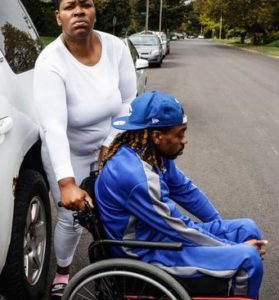Newly-released bodycam video shows two Dayton, Ohio, white cops yanking a paraplegic black man out of his vehicle and throwing him to the ground after stopping him for a traffic offense on September 30, 2021.
The cops wanted him out of the vehicle so a dog could sniff for drugs.
 When Clifford Owensby (photo, left) told the cops he was paraplegic, they offered to help him exit the car, but he was unwilling. After warning him they would use force, one of the cops grabbed him by his hair and dragged him out, and the cops then pinned him to the ground. Owensby claims he suffered a back injury during the encounter.
When Clifford Owensby (photo, left) told the cops he was paraplegic, they offered to help him exit the car, but he was unwilling. After warning him they would use force, one of the cops grabbed him by his hair and dragged him out, and the cops then pinned him to the ground. Owensby claims he suffered a back injury during the encounter.
Owensby has a record that includes drug and firearms violations. Dayton police say the traffic stop was “part of a drug investigation.” A Dayton newspaper reported, “The officer tells Owensby that due to his history, which includes drug charges, they are going to get a K-9 to do a free air smell around the vehicle and Owensby must exit the car.”
Normally, police need either probable cause, consent, or a search warrant to conduct a vehicle search. A past drug record isn’t probable cause, Owensby obviously didn’t consent to a vehicle search, and it’s unlikely the cops had a search warrant, so there’s a good chance this was an illegal vehicle search. However, that will be for the courts to determine.
In any case, “there were no drugs or firearms in the vehicle,” the newspaper said, but “Dayton police said $22,450 was recovered from the vehicle that a narcotic canine alerted on.” If the search was illegal, they won’t be able to use that evidence against him in court.
The traffic offense consisted of tinted windows and an allegedly improperly restrained child in the back seat. Nobody gets violently arrested for tinted windows, and everyone will see that as a pretext for the stop. Child safety is another matter. No one would question stopping a driver for that.\
But would a white disabled driver have been treated that way? A lot of people will ask that question.
Read story here, here, and here.
Related story: “Police face a ‘crisis of trust’ with black motorists,” NBC News says. In response, “In March [2021], Virginia became the first state to prohibit the kind of low-level traffic stops that disproportionately affect people of color and are often used as pretexts to search for drugs and weapons.” Traffic stops have a long history of being used by cops for purposes other than traffic safety. Public defenders in that state, who pushed for the law change, argue that it “will dramatically reduce race-based policing.” Washington is among states considering similar measures. Read that story here.